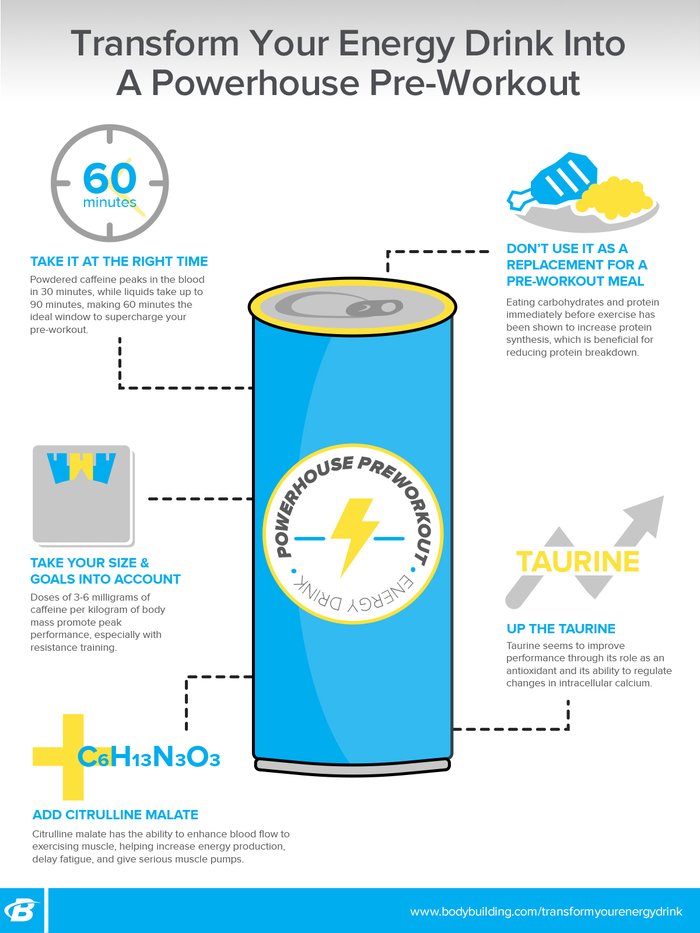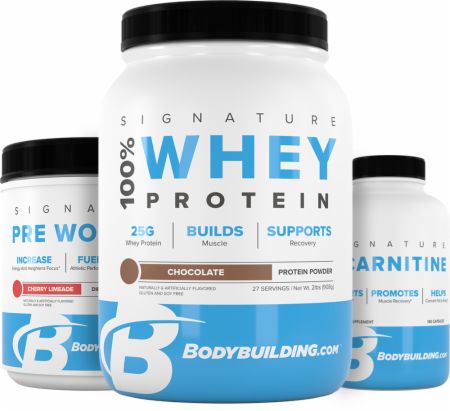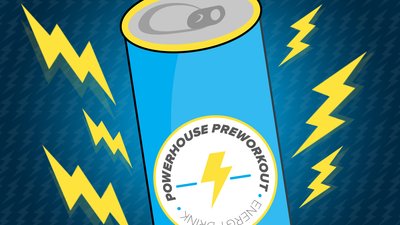Energy drinks are one of the most widely used dietary supplements available, with consumption rates as high as 42 percent among athletes, and just as high among nonathletes.[1] The ubiquitous ingredient responsible for these desired effects is, of course, caffeine, the same substance that's powering most popular pre-workout blends. But plenty of energy drinks also contain brain-boosting nootropics and other novel ingredients that give them a unique appeal beyond the buzz.
So is slamming a can of your favorite energy drink every bit as good as taking a scoop of a pre-workout? Not necessarily. When it comes to the specific challenges of hard training, you may be shortchanging yourself by relying on energy drinks alone.
Here are some tips and tricks to optimize your pre-workout energy drink and help maximize your performance in the gym.
1. Take It at the Right Time
If you're slamming that Monster during your rest periods, don't expect it to add squat to your squat. Likewise, if you took it three hours before your workout, it's not going to do a whole lot of good for you.
Previous research shows pure caffeine ingested in capsule or powder form peaks in the blood in about 30 minutes, while liquids like coffee or energy drinks peak between 60-90 minutes.[2] While timing tends to vary between studies, it's safe to say that the benefits of either ingestion method are available to you right around 60 minutes after consumption.[3,4]
Admittedly, some studies of energy drinks with higher dosages of caffeine show improvements in as little as 15 minutes so as long as you are within an hour of exercise you should be good to go.[5]

2. Don't Use It As A Replacement for A Pre-Workout Meal
Another timing element to keep in mind is the timing of food relative to your energy drink. While caffeine can help you crawl through your day without eating much, it's been shown to be more effective at delaying workout fatigue when combined with carbs.[6]
How does this work? Ingesting carbohydrates and protein immediately before exercise has been shown to increase protein synthesis, which could be beneficial in reducing protein breakdown resulting from exercise.[7] As experienced lifters know, it's also easier to give your max effort in the gym when you're adequately fueled. This pre-workout meal doesn't have to be a feast, though. It should include a mix of mostly simple carbohydrates and protein to give your body the fuel it needs without being difficult to absorb or too heavy on your stomach.
Fruit and peanut butter are an excellent option, or if you're really in a hurry, you could always grab a protein bar. Whatever meal you choose, aim for 35 grams of carbohydrates and at least 6 total grams of essential amino acids, or around 20 grams of high-quality protein.
3. Take Your Size and Goals Into Account
Your ideal caffeine dosage could vary greatly depending on which energy drink you consume, your body size, and what you're ultimately looking to get out of your supplement.
If all you need is a quick pick-me-up for better alertness and concentration during your training session, the normal amount of caffeine in the energy drink should be fine. But if you want to up the ante and really max out your performance in the gym, adding to that caffeine total may be the way to go.
Peak performance typically occurs at doses between 3-6 milligrams of caffeine per kilogram of body mass, particularly with anaerobic exercise like resistance training.[3,4,8] For someone who weighs, say, 175 pounds (79 kilograms), that's between 237-474 milligrams of caffeine. Since most commercially available energy drinks have about 160 milligrams of caffeine in them, supplemental caffeine may be helpful, particularly if you're a larger individual or are preparing for a serious training session.
Caffeine anhydrous in capsule form has a shorter absorption time, so one option is to drink your energy drink about an hour before exercise, then supplement with an additional capsule of caffeine 30 minutes out to get you into that perfect 3-6 milligrams per kilogram zone. Not only will this put you at peak concentrations in the blood right around the time you start exercising, you'll also have the added benefit of staggering your intake to help the effects last longer.
It's worth noting, though, that this is a lot of caffeine! If you're sensitive to the effects or don't have a tolerance built up, either skip the pill or save it for a special occasion.
4. Up the Taurine
Another common ingredient found in most energy drinks is taurine. It may seem like an afterthought in your drink compared to the caffeine, but it shouldn't be. According to a recent meta-analysis looking at the effects of energy drinks on exercise performance, the amount of taurine present in an energy drink correlated more to positive exercise effects than the amount of caffeine present![9]
One study, which used an energy drink with a taurine concentration of 18.7 milligrams per kilogram of body weight—or 1.4 grams for a 175-pound person—reported increased peak power for bench presses and half squats, compared to a placebo.[10] Another recently published study found that, compared to a moderate dose of caffeine, 5 grams of taurine resulted in greater anaerobic power.[11]
Taurine seems to improve performance through its role as an antioxidant and its ability to regulate changes in intracellular calcium.[12] However, what's more important to remember is that, like caffeine, the ingredient doesn't matter as much as the dose. Taurine is typically included at dosages of 2 grams or less in energy drinks, while at least 4-5 grams is recommended for optimal results in the gym.
5. Add Citrulline Malate
Citrulline malate appears in a lot of pre-workout supplements because of its ability to enhance blood flow to exercising muscle, which helps increase energy production, delay fatigue, and of course, give serious muscle pumps. Typically, the recommended dosage is between 6-8 grams up to one hour before exercise. And no, you're not going to find that in any energy drink that I know of!
In general, citrulline malate helps with short bursts of high-intensity activity. One study reported that 8 grams ingested one hour before exercise resulted in increased grip strength as well as increased maximum power production during resistance exercise.[13,14] Additionally, when taken prior to slightly more prolonged exercise, 8 grams of citrulline malate resulted in significantly more repetitions to failure and greater anaerobic power in females.[15]
The Best Way to Supercharge Your Energy Drink
The important thing to remember with any of these ingredients is timing. The ideal window seems to be 60 minutes if you want your favorite energy drink to supercharge your workout. The complementary effects of caffeine, taurine, and citrulline malate on exercise performance will help optimize your stack and allow you to customize your pre-workout to your exact specifications.
When choosing supplements, remember that you want to get 3-6 milligrams per kilogram of body weight for caffeine, at least 4-5 grams total of taurine, and between 6-8 grams total of citrulline malate in order for them to be as effective as possible. Consider keeping them around to create your own kick-ass pre-workout next time you're in need!

References
- Petróczi, A., Naughton, D. P., Pearce, G., Bailey, R., Bloodworth, A., & McNamee, M. (2008). Nutritional supplement use by elite young UK athletes: fallacies of advice regarding efficacy. Journal of the International Society of Sports Nutrition, 5(1), 22.
- White Jr, J. R., Padowski, J. M., Zhong, Y., Chen, G., Luo, S., Lazarus, P., ... & McPherson, S. (2016). Pharmacokinetic analysis and comparison of caffeine administered rapidly or slowly in coffee chilled or hot versus chilled energy drink in healthy young adults. Clinical Toxicology, 54(4), 308-312.
- Woolf, K., Bidwell, W. K., & Carlson, A. G. (2008). The effect of caffeine as an ergogenic aid in anaerobic exercise. International Journal of Sport Nutrition and Exercise Metabolism, 18(4), 412-429.
- Beck, T. W., Housh, T. J., Schmidt, R. J., Johnson, G. O., Housh, D. J., Coburn, J. W., & Malek, M. H. (2006). The acute effects of a caffeine-containing supplement on strength, muscular endurance, and anaerobic capabilities. The Journal of Strength & Conditioning Research, 20(3), 506-510.
- Lockwood, C. M., Moon, J. R., Smith, A. E., Tobkin, S. E., Kendall, K. L., Graef, J. L., ... & Stout, J. R. (2010). Low-calorie energy drink improves physiological response to exercise in previously sedentary men: a placebo-controlled efficacy and safety study. The Journal of Strength & Conditioning Research, 24(8), 2227-2238.
- Erickson, M. A., Schwarzkopf, R. J., & McKenzie, R. D. (1987). Effects of caffeine, fructose, and glucose ingestion on muscle glycogen utilization during exercise. Medicine and Science in Sports and Exercise, 19(6), 579-583.
- Tipton, K. D., Rasmussen, B. B., Miller, S. L., Wolf, S. E., Owens-Stovall, S. K., Petrini, B. E., & Wolfe, R. R. (2001). Timing of amino acid-carbohydrate ingestion alters anabolic response of muscle to resistance exercise. American Journal of Physiology-Endocrinology and Metabolism, 281(2), E197-E206.
- Astorino, T. A., Rohmann, R. L., & Firth, K. (2008). Effect of caffeine ingestion on one-repetition maximum muscular strength. European Journal of Applied Physiology, 102(2), 127-132.
- Souza, D. B., Del Coso, J., Casonatto, J., & Polito, M. D. (2017). Acute effects of caffeine-containing energy drinks on physical performance: a systematic review and meta-analysis. European Journal of Nutrition, 1-15.
- Del Coso, J., Salinero, J. J., González-Millán, C., Abián-Vicén, J., & Pérez-González, B. (2012). Dose response effects of a caffeine-containing energy drink on muscle performance: a repeated measures design. Journal of the International Society of Sports Nutrition, 9(1), 21.
- Warnock, R., Jeffries, O., Patterson, S., & Waldron, M. (2017). The Effects of Caffeine, Taurine or Caffeine-Taurine Co-Ingestion on Repeat-Sprint Cycling Performance and Physiological Responses. International Journal of Sports Physiology and Performance, 1-24.
- Huxtable, R. J. (1992). Physiological actions of taurine. Physiological Reviews, 72(1), 101-163.
- Glenn, J. M., Gray, M., Jensen, A., Stone, M. S., & Vincenzo, J. L. (2016). Acute citrulline-malate supplementation improves maximal strength and anaerobic power in female, masters athletes tennis players. European Journal of Sport Science, 16(8), 1095-1103.
- Glenn, J. M., Gray, M., Wethington, L. N., Stone, M. S., Stewart, R. W., & Moyen, N. E. (2017). Acute citrulline malate supplementation improves upper-and lower-body submaximal weightlifting exercise performance in resistance-trained females. European Journal of Nutrition, 56(2), 775-784.
- Wax, B., Kavazis, A. N., Weldon, K., & Sperlak, J. (2015). Effects of supplemental citrulline malate ingestion during repeated bouts of lower-body exercise in advanced weightlifters. The Journal of Strength & Conditioning Research, 29(3), 786-792.



